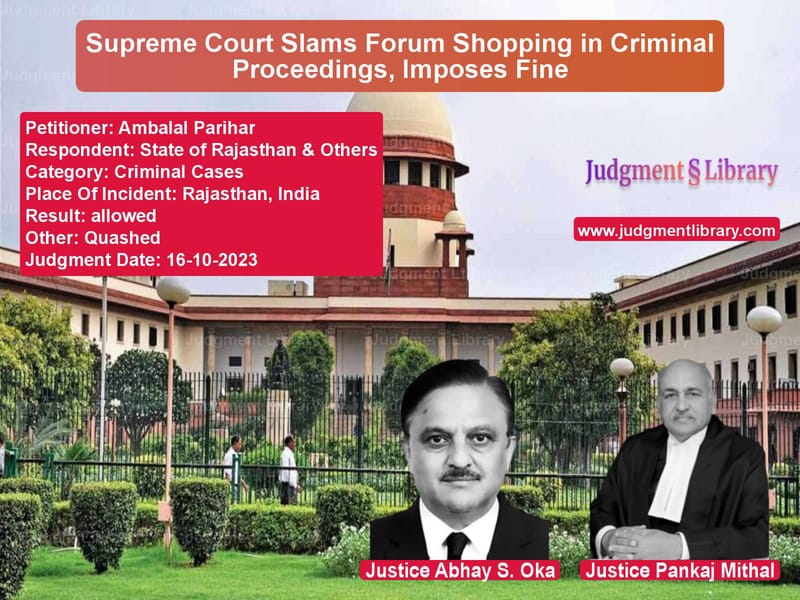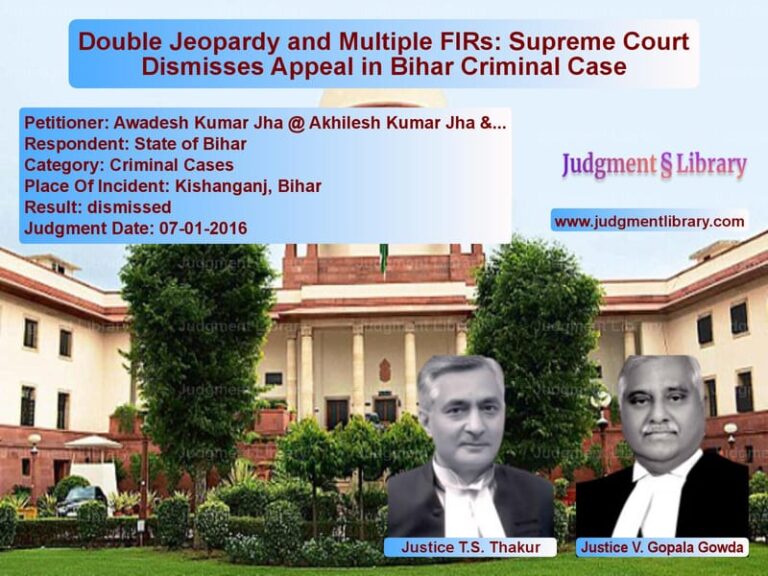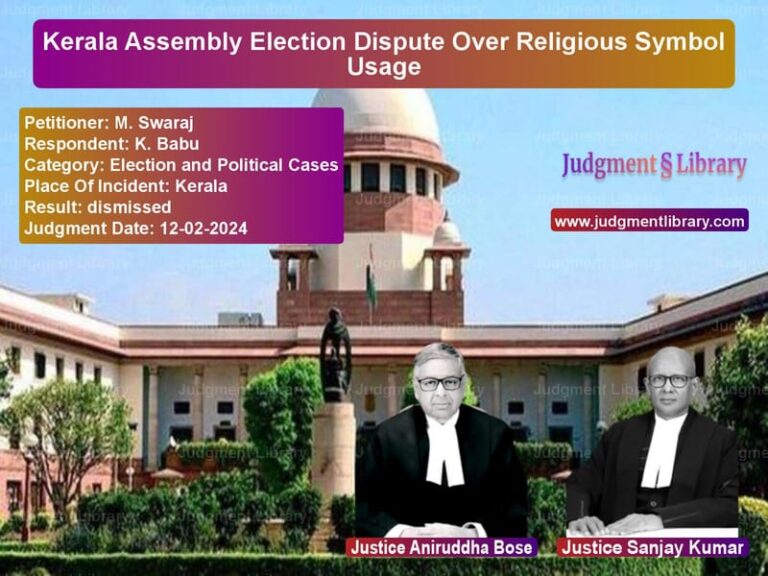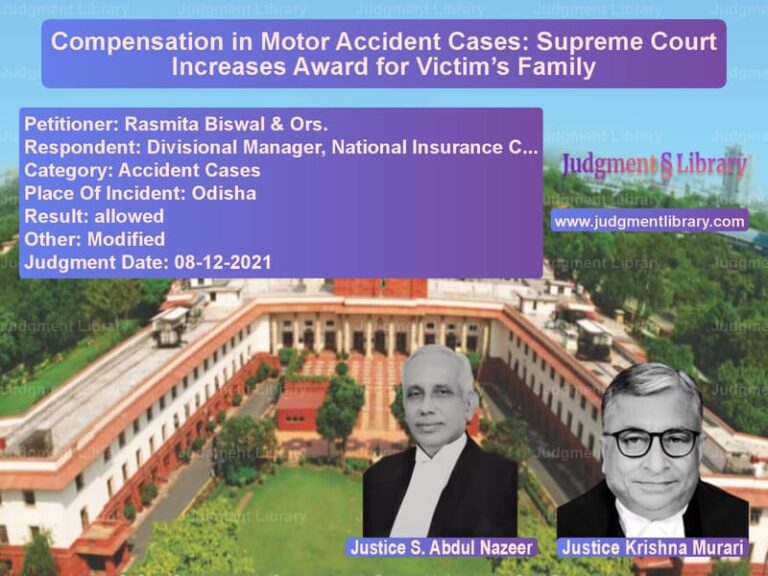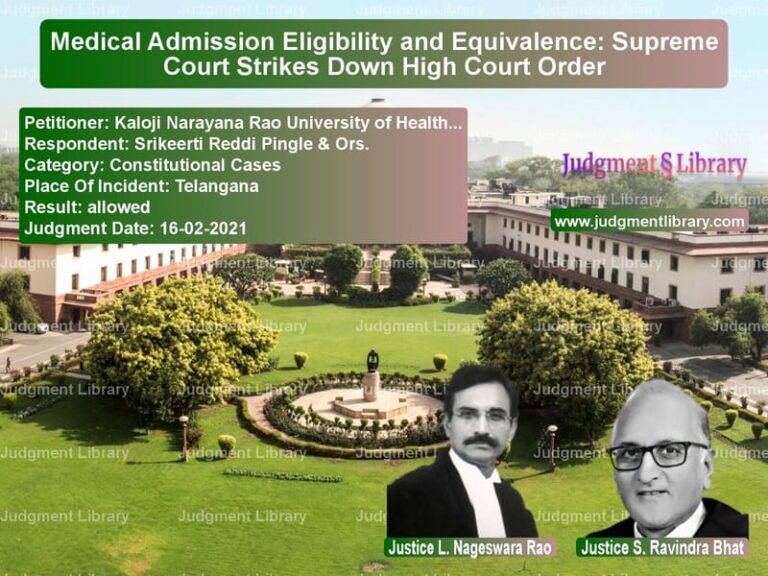Supreme Court Slams Forum Shopping in Criminal Proceedings, Imposes Fine
The Supreme Court of India recently ruled in Ambalal Parihar v. State of Rajasthan & Others, highlighting the misuse of legal processes and forum shopping by litigants. The case involved multiple First Information Reports (FIRs) against the respondents, who sought relief through different legal avenues to evade due process. The Supreme Court strongly condemned this approach, reinforcing judicial discipline and procedural integrity.
Background of the Case
The appellant, Ambalal Parihar, had lodged six FIRs against respondents 2 to 4, accusing them of criminal offenses. Two additional FIRs were filed against the same respondents by other complainants. The respondents initially approached the Rajasthan High Court by filing petitions under Section 482 of the Code of Criminal Procedure (CrPC) to quash the FIRs. However, the High Court did not grant them interim relief.
In an extraordinary move, the respondents subsequently filed a Civil Writ Petition, seeking consolidation of all eight FIRs and a direction preventing coercive action against them. On May 8, 2023, the Single Judge of the Rajasthan High Court granted their request and restrained the authorities from taking action against them.
Legal Issues Raised
- Whether a Civil Writ Petition could be used to club multiple FIRs when criminal petitions under Section 482 CrPC were already pending.
- Whether the respondents engaged in forum shopping to avoid the roster judge who had earlier denied them relief.
- Whether filing a civil writ petition for clubbing FIRs was a permissible legal remedy.
- Whether the High Court’s order restraining coercive action violated the proper judicial procedure.
Arguments by the Appellant (Ambalal Parihar)
- The respondents abused the legal system by filing a civil writ petition after failing to obtain relief in criminal proceedings.
- Forum shopping is impermissible and undermines judicial discipline.
- The High Court’s civil writ order granted blanket protection without considering the gravity of the allegations.
- The respondents’ actions amounted to a gross misuse of process to bypass the judge who had earlier refused interim relief.
Arguments by the Respondents (Accused Individuals)
- The civil writ petition was filed to seek a practical solution by consolidating the FIRs.
- The High Court had the authority to club similar FIRs to prevent multiplicity of proceedings.
- The writ petition was filed in good faith to avoid harassment.
- There was no malicious intent in approaching a different forum.
Supreme Court’s Observations
The Supreme Court strongly criticized the respondents’ conduct, calling it a clear case of forum shopping. Key observations included:
- The respondents first sought relief under Section 482 CrPC, where no interim relief was granted. They then filed a civil writ petition seeking the same relief.
- The High Court had a separate roster for criminal cases, and the civil writ petition should have been converted into a criminal writ petition and placed before the appropriate bench.
- By pursuing the civil writ petition route, the respondents circumvented the judicial discipline established by the High Court’s roster system.
- “If courts allow such sharp practices, the roster notified by the Chief Justice will have no meaning,” the Court remarked.
- Judges must follow roster discipline and should not entertain cases outside their assigned jurisdiction.
The Supreme Court relied on past precedents to emphasize the impropriety of forum shopping:
- Chetak Construction Ltd. v. Om Prakash (1998) – Held that litigants cannot pick and choose forums to obtain favorable orders.
- Krishna Lal Chawla v. State of U.P. (2021) – Stated that legal processes should not be misused to delay proceedings.
- Union of India v. Cipla Ltd. (2017) – Clarified that the roster system is essential for judicial functioning.
Final Judgment
The Supreme Court allowed the appeal and delivered the following orders:
- The Civil Writ Petition No. 6277 of 2023 was dismissed as it was a gross abuse of process.
- The High Court’s May 8, 2023 order restraining coercive action was quashed.
- The respondents were directed to pay a fine of ₹50,000 to the Rajasthan State Legal Services Authority within one month.
- The concerned court hearing the Section 482 CrPC petitions was directed to take note of the respondents’ conduct.
- The Registrar (Judicial) of the Rajasthan High Court was ordered to place a copy of the Supreme Court’s ruling in all pending petitions filed by the respondents.
Implications of the Judgment
This ruling sets a precedent against forum shopping and reinforces judicial discipline:
- Prevents misuse of legal forums: Litigants cannot bypass roster judges by filing separate petitions in different jurisdictions.
- Strengthens judicial integrity: Judges must follow the Chief Justice’s roster assignments to maintain consistency.
- Discourages unethical litigation practices: The imposition of costs acts as a deterrent against forum shopping.
- Ensures fair criminal proceedings: Accused individuals must follow due process rather than seek undue protection through alternative legal channels.
The Supreme Court’s ruling reinforces the principle that judicial proceedings must be conducted in a fair and orderly manner, ensuring that litigants do not manipulate the system to their advantage.
Petitioner Name: Ambalal Parihar.Respondent Name: State of Rajasthan & Others.Judgment By: Justice Abhay S. Oka, Justice Pankaj Mithal.Place Of Incident: Rajasthan, India.Judgment Date: 16-10-2023.
Don’t miss out on the full details! Download the complete judgment in PDF format below and gain valuable insights instantly!
Download Judgment: ambalal-parihar-vs-state-of-rajasthan-&-supreme-court-of-india-judgment-dated-16-10-2023.pdf
Directly Download Judgment: Directly download this Judgment
See all petitions in Bail and Anticipatory Bail
See all petitions in Legal Malpractice
See all petitions in Contempt Of Court cases
See all petitions in Judgment by Abhay S. Oka
See all petitions in Judgment by Pankaj Mithal
See all petitions in allowed
See all petitions in Quashed
See all petitions in supreme court of India judgments October 2023
See all petitions in 2023 judgments
See all posts in Criminal Cases Category
See all allowed petitions in Criminal Cases Category
See all Dismissed petitions in Criminal Cases Category
See all partially allowed petitions in Criminal Cases Category

